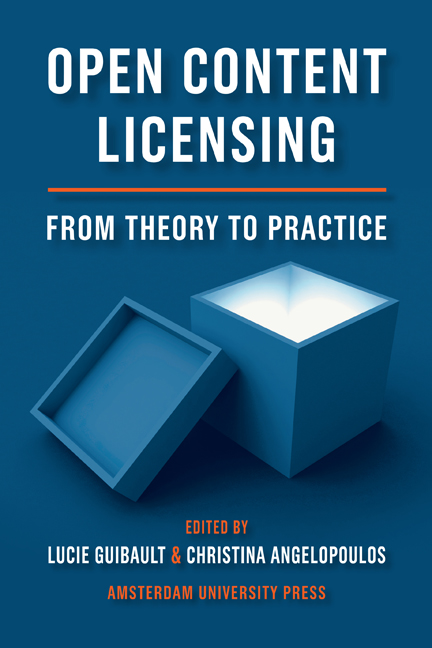Book contents
- Frontmatter
- Contents
- 1 Open Content Licensing: From Theory to Practice – An Introduction
- 2 Towards a New Social Contract: Free-Licensing into the Knowledge Commons
- 3 Is Open Content a Victim of its Own Success? Some Economic Thoughts on the Standardization of Licenses
- 4 (Re)introducing Formalities in Copyright as a Strategy for the Public Domain
- 5 User-Related Assets and Drawbacks of Open Content Licensing
- 6 Owning the Right to Open Up Access to Scientific Publications
- 7 Friends or Foes? Creative Commons, Freedom of Information Law and the European Union Framework for Reuse of Public Sector Information
- 8 Contributing to Conversational Copyright: Creative Commons Licenses and Cultural Heritage Institutions
- 9 Creative Commons and Related Rights in Sound Recordings: Are the Two Systems Compatible?
6 - Owning the Right to Open Up Access to Scientific Publications
Published online by Cambridge University Press: 22 January 2021
- Frontmatter
- Contents
- 1 Open Content Licensing: From Theory to Practice – An Introduction
- 2 Towards a New Social Contract: Free-Licensing into the Knowledge Commons
- 3 Is Open Content a Victim of its Own Success? Some Economic Thoughts on the Standardization of Licenses
- 4 (Re)introducing Formalities in Copyright as a Strategy for the Public Domain
- 5 User-Related Assets and Drawbacks of Open Content Licensing
- 6 Owning the Right to Open Up Access to Scientific Publications
- 7 Friends or Foes? Creative Commons, Freedom of Information Law and the European Union Framework for Reuse of Public Sector Information
- 8 Contributing to Conversational Copyright: Creative Commons Licenses and Cultural Heritage Institutions
- 9 Creative Commons and Related Rights in Sound Recordings: Are the Two Systems Compatible?
Summary
Introduction
Innovative scientific research plays a crucial role in addressing global challenges, such as healthcare and environmental and security issues, while research in social sciences and the humanities occupies a key function in understanding emerging social phenomena. The speed and depth of scientific research, understood in its broadest sense, depends on fostering collaborative exchanges between different communities and assuring its widest dissemination. This, in turn, is fundamental for the constant evolution of science and human progress. Access to research output not only increases the returns from public investment in this area, but also reinforces open scientific inquiry. It encourages diversity of opinion, promotes new areas of work and enables the exploration of topics not envisioned by the initial investigators. Collaborative exchanges help avoid the unnecessary duplication of research and address some of the global health inequalities. Timely and cost-efficient access to scientific research, therefore, contributes to increasing general economic and social welfare. More than any other kind of research, publicly funded scientific research constitutes an essential building block for further progress and innovation, one that is often seen as a collective good. For this reason, the common assumption is that, for the greater good of science and the public interest, publicly funded research should be made accessible without restriction. This principle of unfettered access also entails the freedom to use and reuse publicly funded scientific research.
In a world where public funding for university research is constantly shrinking and where the price of scientific journals is continuously increasing, providing researchers with the widest access possible to high quality peer-reviewed scientific material at low cost is a very difficult objective to attain indeed. Several reports and studies conducted in Europe on scientific and scholarly publishing describe a situation where, under the traditional scientific publishing model, research institutions and university libraries commonly have to pay thrice for the material they produce: first, by offering academics the infrastructure to publish their articles; second, by subscribing to the journal in which their researchers’ articles appear; and third, by paying remuneration for the right to reproduce these articles for research purposes or inside a student course pack.
- Type
- Chapter
- Information
- Open Content LicensingFrom Theory to Practice, pp. 137 - 168Publisher: Amsterdam University PressPrint publication year: 2012
- 1
- Cited by



